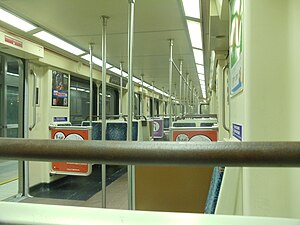Breda A650
This article needs additional citations for verification. (December 2013) |
| Breda A650 | |
|---|---|
 | |
 | |
| In service | 1993–present |
| Manufacturer | Breda |
| Constructed | 1988–1997 |
| Entered service | 1993–1998 |
| Number built | 104 |
| Formation | 2 cars per trainset |
| Capacity | 180 passengers per car (60 seated) 720 passengers (total; 4-car train) 1080 passengers (total; 6-car train) |
| Operators | Los Angeles County Metropolitan Transportation Authority |
| Lines served | |
| Specifications | |
| Car body construction | Stainless steel |
| Train length | 450 ft (137.16 m) (6-car train) |
| Car length | 75 ft (22.86 m) |
| Width | 10 ft (3.05 m) |
| Height | 12 ft (3.66 m) |
| Floor height | 3.73 ft (1.14 m) |
| Doors | 6 per car, 3 on each side |
| Maximum speed | 70 mph (110 km/h) |
| Weight | 80,000 pounds (36,290 kg) |
| Traction system | Westinghouse Chopper Control DC Traction (cars 501-530) Four General Electric "5GEB" 3 Phase, 4 pole, Asynchronous AC Traction Drives with GTO Inverters (cars 531-604) |
| Acceleration | 3 mph/s (4.4 ft/s2; 1.3 m/s2) |
| Deceleration | 2.2 mph/s (3.2 ft/s2; 0.98 m/s2) |
| Electric system(s) | 650–950 V DC Third rail |
| Current collector(s) | Contact shoe |
| Safety system(s) | Automatic Train Control, Automatic Train Protection |
| Track gauge | 4 ft 8+1⁄2 in (1,435 mm) standard gauge |
| Notes/references | |
| [1] | |
The A650 is an electric multiple unit heavy rail car built for use on the Los Angeles County Metro Rail system. The cars were manufactured by the Italian Breda company (now Hitachi Rail Italy) at its Pistoia plant between 1988 and 1997 and are used on the Metro's B and D Lines.
Details
The fleet of 104 vehicles was supplied in two orders:
The first vehicles (fleet numbers 501–530) were built between 1988 and 1993 and are propelled by a Chopper traction control system manufactured by Westinghouse.
The remaining vehicles (fleet numbers 531–604), were built between 1995 and 1997 and include AC inverter traction control and intercar safety barriers.
The acceleration for this last group of cars is almost identical to that of the now-retired 1000 series cars found on the Washington Metro because they both utilize the same General Electric AC traction motors.
These cars share a design very similar to the Budd Universal Transit Vehicle, which was built between 1982 and 1986 for the Baltimore Metro Subway and the Miami Metrorail; in fact, Budd's UTV was originally intended to be the Metro's train, but as Budd/TransitAmerica stopped railcar manufacturing in 1987, the Italian Breda company (following its success with the 2000, 3000 and 4000 Series cars for the Washington Metro) was contracted to build an as-similar-as-possible variant. As such, the A650 shares the UTV's bodyshell, layout and general appearance.[2]
Costing $1.5 million each, the trains usually run in four to six car consists, and feature automatic train control, air conditioning, emergency intercoms, wheelchair spaces and emergency braking.
The fleet is maintained in a yard south of Union Station on Santa Fe Drive near 4th Street on the west bank of the Los Angeles River in Downtown Los Angeles.
Replacement
The A650 series will be fully replaced in 2024. LACMTA has signed a contract with CRRC to acquire new heavy rail vehicles, dubbed the HR4000 series.
In popular culture
Because Los Angeles is the home of many television and production agencies, A650 subway cars are featured in countless commercials, TV shows and movies.
The Breda A650 was depicted as being burned in the tunnel between MacArthur Park and Metro Center in the 1997 film Volcano, when a lava flow through the tunnel causes all passengers and conductor to pass out on board. The A650 was featured in Speed when the emergency brake feature stops and the train derails.
It is also featured in SWAT and it is seen taking a nosedive plummet from a mountain as the cataclysmic events of December 21, 2012, unfold in 2012.
See also
References
- ^ "Los Angeles HRV" (PDF). AnsaldoBreda. Retrieved December 3, 2013.[permanent dead link]
- ^ "Los Angeles HRV" (PDF). AnsaldoBreda. 2007-10-06. Archived from the original (PDF) on 2007-10-06. Retrieved 2019-05-30.
